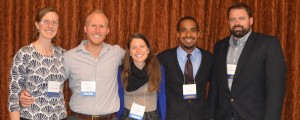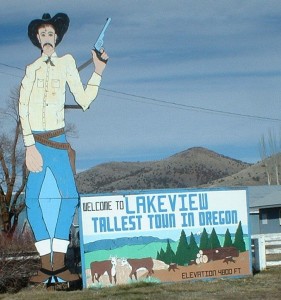This year, the Community Planning Workshop at the University of Oregon explored its glamorous side with the Oregon Historic Theaters Project. Robert Parker, CPW Director and Project Advisor, along with Aniko Drlik-Muehleck, Project Manager, hit the road with student team members Dana Nichols, Rodney Bohner, John Jackson, and Craig Wiroll to explore these incredible cultural gems that have anchored downtown’s and delighted audiences throughout the state of Oregon for over 50 years.
ABOUT THE PROJECT
CPW undertook a 3-part investigation of historic theaters and their potential to act as economic development catalysts. Phase 1 located theaters across the state that qualified as “historic” (50 years or older).
Phase 2 began in January 2015 with a needs assessment surveys sent to theaters asking operators and owners to explain their business model and describe their needs related to building rehabilitation and maintenance, equipment upgrades, programming, and marketing.
Phase 3 coordinated marketing, where CPW worked with theater operators and owners along with regional tourism agencies to explore marketing strategies and link theater professionals with Oregon’s tourism industry to help theaters capitalize on their historic and entertainment value.
WHY IS THIS IMPORTANT?
This project comes at a particularly critical moment for downtown theaters. The rising cost of maintenance and operation has dealt a hefty financial blow and forced many theaters to close their doors. Movie theaters, for example, face $50,000 minimum to upgrade to digital projection systems. In a town with less than 3000 people, how can a theater afford such an investment? As it turns out, not too many as you will see by the statistics and theatre fans in this video documenting the Oregon Historic Theatres project.
Together with Oregon Main Street, Pacific Power, and Travel Oregon (project partners), CPW hopes this project will build on the energy of grassroots movements across the state and the documentation, needs assessments, and tourism coordination will answer questions and will generate resources so historic theaters can adapt. And as they say in theatre, the show must go on!
Special to curtain call to Craig Wiroll, who took on the CPW video challenge and produced one amazing video that truly captures the story of this project. Thank you Craig.
About the Oregon Historic Theatres Team from left to right:
Aniko Drlik-Muehleck, originally from Berkeley, CA, is now a Master of Community and Regional Planning candidate at the University of Oregon and participated in the Community Service Center’s RARE AmeriCorps Program – Resource Assistance for Rural Environments with the City of Pendleton from 2012-2013.
Craig Wiroll is a journalist and farmer-turned-Master of Public Administration student with high hopes of changing the world. For now, he’s just going to focus on the UO Campus. Craig is also a two-time AmeriCorps alum from Wisconsin, who enjoys public radio, hiking and food.
Dana Nichols is a first year Community and Regional Planning student who enjoys cooking, gardening, and playing with her cat, Dinkus. Although she is a New Jersey native and could live off their delicious pizza, Dana would much rather be watching a Packer game in Wisconsin or sailing on a boat in Maine.
John Jackson is a Midwesterner is a first year Community and Regional Planning Masters student at the University of Oregon. Growing up both in Chicago, Illinois and Lincoln, Nebraska, Jackson is an avid geographer who has taken his talents to the Pacific Northwest to study the craft of urban planning and the unique ways of land use, built environment, and transportation that U of O has to offer.
Rodney Bohner is a concurrent Master’s student in Community and Regional Planning as well as Historic Preservation at the University of Oregon. Originally from Pennsylvania, Rodney has worked on cultural resource projects in the Keystone state as well as Colorado, West Virginia, and Massachusetts.



